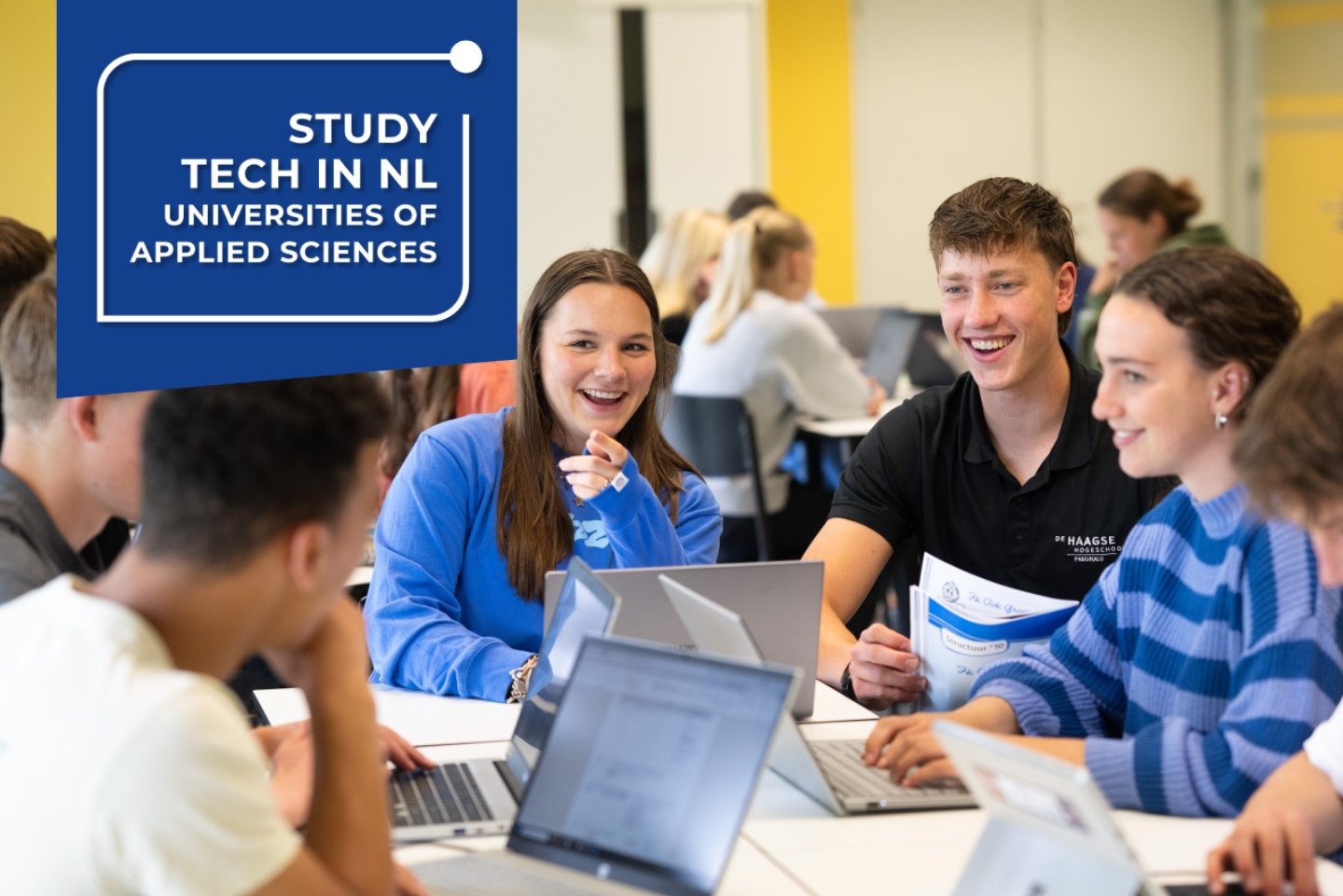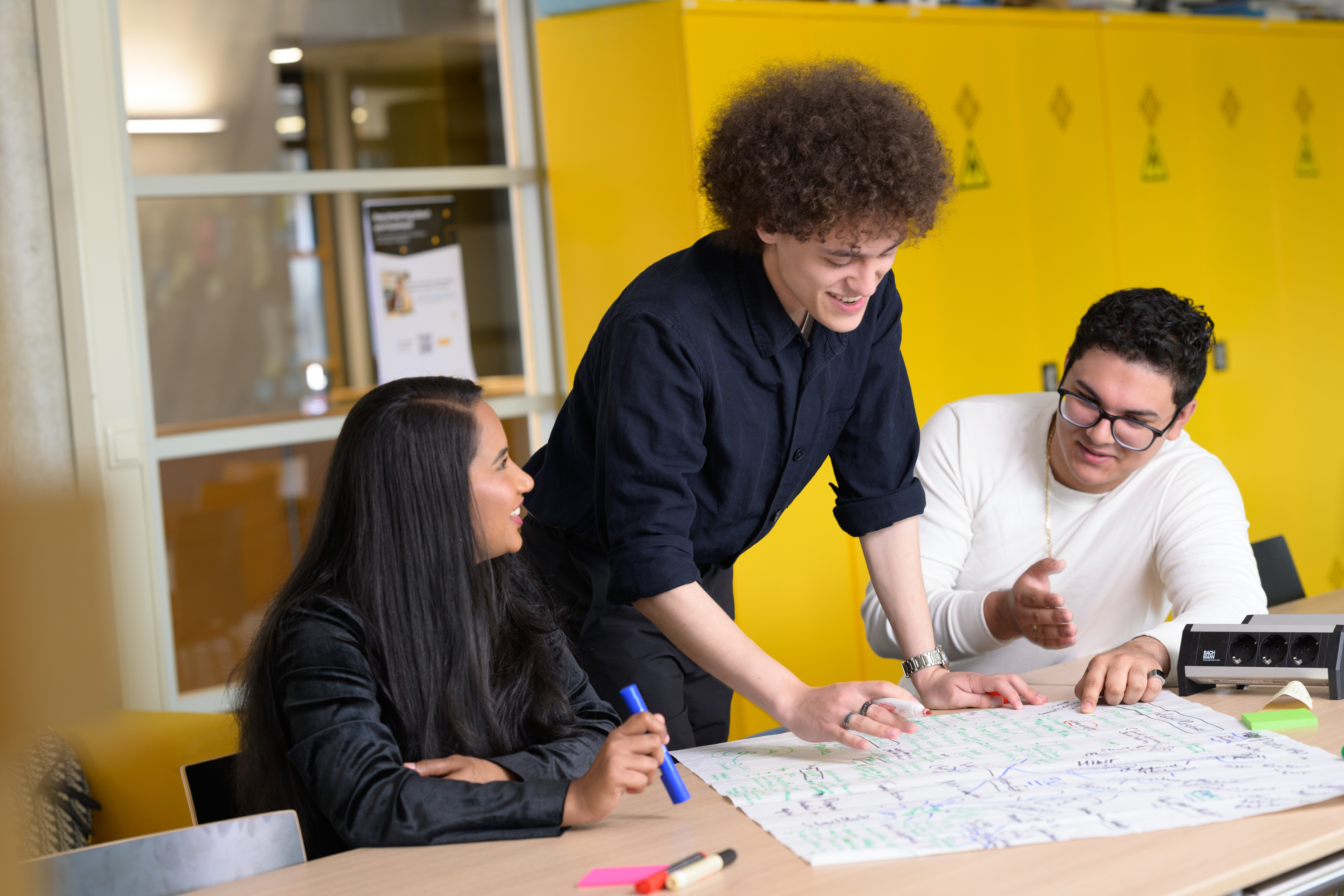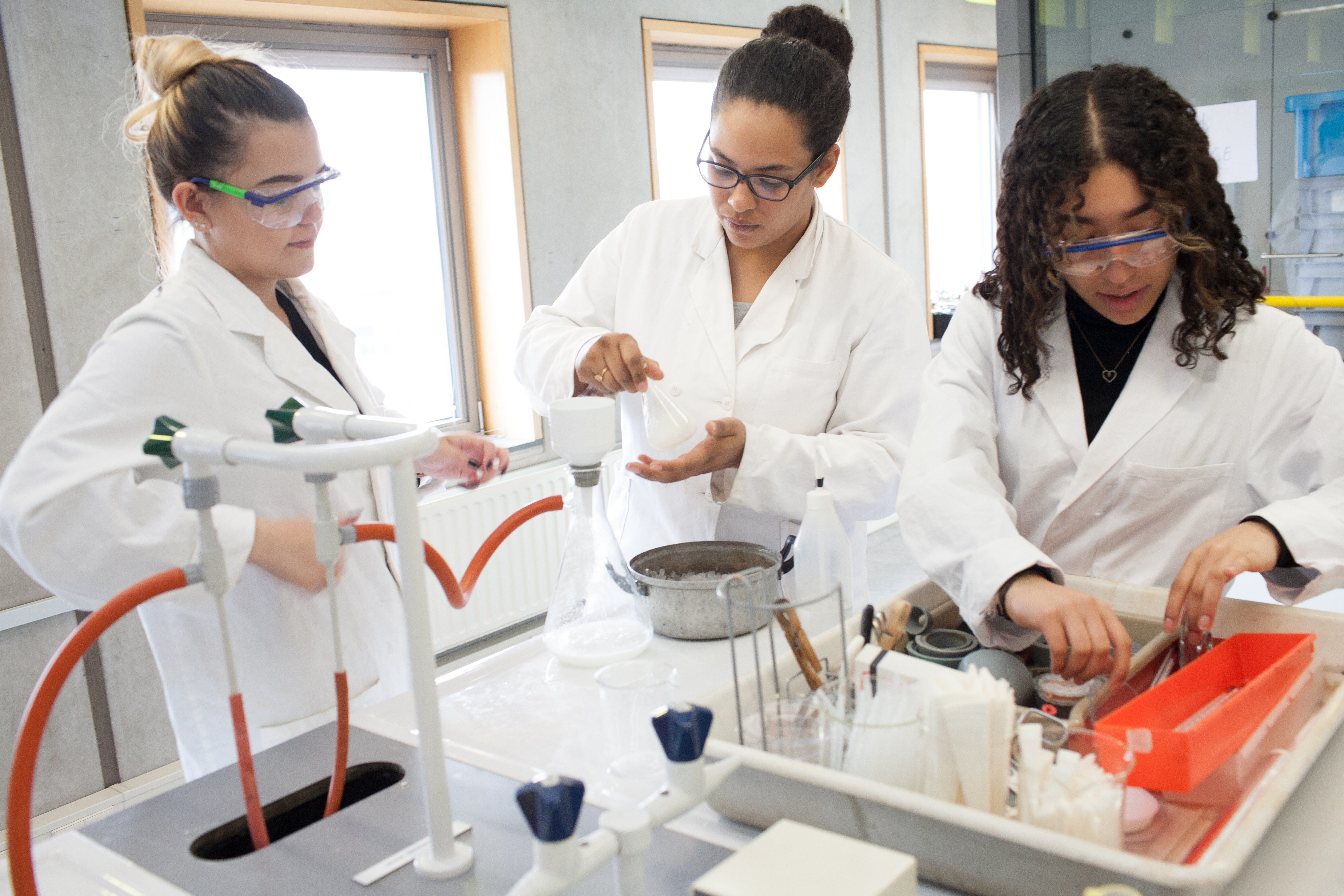For you?
The global demand for advanced information technology is growing. Businesses need IT that transforms technical challenges into smart, reliable solutions. The Applied Computer Science Degree Programme at The Hague University of Applied Sciences will help you explore the intersection where tech and IT meet. It teaches you how to make machines, computers, and networks run, and even design them yourself. This English-taught bachelor's degree programme is completed in just 3 years, instead of 4.
This will prepare you for a job in the high-tech sector in no time!
Applied Computer Science is for the curious problem-solvers, proud nerds, and ambitious techies. We challenge you to question everything, experiment, and think outside the box. This way we ensure that you will be ready in no time to start working at high-tech companies and startups in Europe, or to progress to a master's degree programme at THUAS or a technical university.
Applied Computer Science is taught in Delft, right in the middle of the tech hub of South Holland.
You will learn to programme computer systems using languages like Python and C so that they perform tasks independently, communicate with each other and are used in smart devices around us. Once you understand how it all works, you can automate everything and make it do what you want. AI is becoming more and more important in this process as well. You will be given the opportunity to delve into cybersecurity and embedded systems.
You will also learn how to collaborate professionally with people from diverse cultural backgrounds and how to guide them through the world of high-tech solutions. In addition, you will discover how humans and AI collaborate intelligently and carefully, and how to continually weigh the value and ethics of technology.
At THUAS, you learn by doing. In labs, through projects, in collaboration with knowledge centres, and on behalf of businesses. No thick textbooks or examinations afterwards: we assess and test during the classes.
Admission requirements
You have a dutch diploma
| Preliminary education | Required profile |
|---|---|
| Havo (senior general secondary education) | Does not quailify for admission |
| Vwo (pre-university education) |
|
| Mbo (senior secondary vocational education and training) | Does not qualify for admission |
Other situations
You may not be directly admissible, for example, because you don't have the appropriate prior education or haven't taken an examination in a required subject. Click here to see what options are available to get started at THUAS after all.
You have a non-Dutch diploma
If you want to start at the UXD programme, you need a secondary school diploma comparable to a Dutch VWO diploma plus a good command of English. Before deciding on your eligibility, we’ll need to assess your secondary school certificate. To make sure certifications are evaluated fairly, we work with NUFFIC, an organisation that specialises in the assessment of international education qualifications.
Language requirements
If you were not educated in the Netherlands you usually have to submit a language test to be admitted. Depending on the type and country of your diploma you may however qualify for exemption. Please check our entry requirements page for more information.
You want to transfer to THUAS
Are you looking to transfer from a (technical) university or another university of applied sciences? This is only possible at the beginning of a new academic year. For more information, please contact our student administration
Statements regarding your admission
No exceptions can be made to the official admission requirements. Only the CSI Department can make statements about your eligibility based on the official regulations. No rights can be derived from communications from others regarding your eligibility and information on this website.
Programme content
What will you study each year?
Degree programme in figures
Discover THUAS
Your guide to our upcoming study-choice events
Career perspective
What you will become
IoT developer
Cybersecurity analyst
Cloud Architect
Technical Software Developer
Systems Programmer
What you won't become
Electronics Engineer
Game Developer
Continue studying
Would you like to continue studying after obtaining your bachelor's degree? In that case you have the option to progress to our hbo master’s degree programmes. Continuing at a technical university is also an obvious choice. For example, you can opt for a master's degree programme, literally around the corner, at Delft University of Technology. There are also plenty of opportunities at other universities in the Netherlands. Consider Radboud University, Leiden University, Eindhoven University of Technology or the University of Twente.
Why study tech in the Netherlands?
Every day you rely on technology - from the chips in your phone to clean energy and smart design. The Netherlands is a global frontrunner in tech and innovation, offering hands-on education and strong career opportunities. Your next level starts here!
🛠 Learn by doing: real projects, real labs, real companies
🚀 Guaranteed jobs in your field: over 350,000 tech vacancies expected in Europe by 2030 and a million globally
🌍 International environment: live in one of Europe’s most open, multicultural, English-friendly and safe student cities
💡 Work with cutting-edge tech: from AI and health tech to clean energy

Testimonials
Who better to tell about the degree programme than our own students? They share their experiences here.
Testimonials
What can you expect from the first year? Our teachers will briefly introduce themselves to you and tell you more about the program and the lessons they teach.
Practical information
What else do you need to know?
How to apply
Your enrolment request must be submitted through Studielink. Before you do, please check the official name of the programme below. Would you like to find out more about the application process first? Check our page How to apply . The key deadlines are listed here as well. This degree programme starts in September and there is no intake in February.
Tuition fee
You will have to pay tuition fees when you enrol on a bachelor's programme. You can pay in one or more instalments. If you pay in more than one instalment a small administration fee is charged.
More information about tuition fees
Scholarships
Find out more about scholarships for international students. Please note that these scholarships are one-off scholarships only, meaning that if you obtain them it is only for your first year of study.
Student finance
Dutch students qualify for extra financial support via a loan. Dutch students automatically qualify for this financial assistance and international students may be eligible if they have lived in the Netherlands for at least five years or are employed for at least 56 hours per month.
Additional Costs
You must also budget for books, excursions and field trips. You can expect to pay approximately €800 per year to cover these additional costs. During your semester abroad, you will also need to pay for tickets, housing and insurance.
Visa and residence permit
Help in choosing your study
We would like to help you make the right decision
It takes a bit of thought and research to find the right programme. The Hague University of Applied Sciences organizes various activities throughout the year to give you the best possible idea of the various studies offered. You also learn what it’s like to study at THUAS. This way, you can click on the registration button without a doubt in mind. Or you’ll know for certain it’s not right for you.
Walk in at our Study & Career Centre for…
Hulp tijdens je studie
Studeren doe je niet alleen
Je krijgt hulp bij het studeren. Aan het begin van je opleiding maak je kennis met je studieloopbaanbegeleider. Dat is altijd een docent van je opleiding. Je kunt bij hem of haar aankloppen als je vragen hebt. Over je studie, je stages, je carrière en nog veel meer. Ook volg je lessen studieloopbaanbegeleiding, waarin je leert studeren. Deze lessen vinden afwisselend klassikaal, in kleine groepen of individueel plaats. Heb je behoefte aan extra hulp? Bijvoorbeeld bij een dipje, ziekte, twijfels of iets anders? Dan ben je altijd welkom bij onze psycholoog, vertrouwenspersoon of decaan.
Voor meer informatie over decanen/studentpsychologen, topsport, ondersteuning bij de Nederlandse taal of studeren met een functiebeperking kijk op onze pagina over ondersteuning tijdens je studie.
Official details of the programme
This degree programme is registered in Registration of Institutions and Programmes (RIO):
- Official Dutch name of degree programme: HBO-ICT
- Official international name: Information and Communication Technology
- Programme code (Isat): 30020
- Institution code (Brin): 27UM
Both the official Dutch and the official international name of the degree programme (current at the time of your graduation) will be printed on your diploma.
For more information on the accreditation of this degree programme, see the Accreditation Organisation of the Netherlands and Flanders (NVAO) website.
Looking for a different degree programme?
You might find these programmes interesting too!



